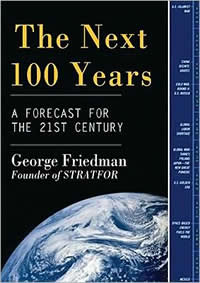Book Notes
 George Friedman, The Next 100 Years; A Forecast for the 21st Century (New York: Doubleday, 2009), 253pp.
George Friedman, The Next 100 Years; A Forecast for the 21st Century (New York: Doubleday, 2009), 253pp.
George Friedman admits that he does not possess any clairvoyant powers. Nor is common sense a reliable guide to forecasting the future, especially when you recall the last hundred years of history and what sort of future people back then imagined for today. But you don't need a crystal ball, he insists, to identify the "the major tendencies — geopolitical, technological, demographic, cultural, military — in their broadest sense, and to define the major events that might take place."
Some of Friedman's predictions are broad and bland: "Productivity gains from robotics and the surge in health care opportunities presented by genetic science will fuel growth" (153). Conversely, the more detailed you get the more likely you might be wrong. But Friedman's book does not lack a coherent narrative. We are now far along into the "American Age," and one point about which he is most insistent is that the United States has barely begun its ascent and hegemony (18, 251). Far from decline, the next hundred years will witness America's unrivaled dominance as the primary actor on the global stage. Another surprise: contrary to many pundits, Friedman believes that both China and Russia will collapse and crumble in the coming century. In the vacuum they create will rise Japan, Turkey, Poland and, in a whole different manner, Mexico, all as rivals to America. The single biggest factor driving these changes is the end of the population explosion and a decline in available labor. Nations that have resisted immigration will beg foreigners to come to their lands, an "ironic but inevitable shift" when it comes to Mexican-American relations.
It's easy to take exception with some of Friedman's "extreme assertions," like his opinion that both the Vietnam war and the war in Iraq are inconsequential skirmishes, his extrapolations about declining birth rates, or that the Islamic world will not constitute a major geo-political fault line in the future. Africa is never mentioned in the book (except for Egypt), and Latin America gets barely a passing nod. On the last page he admits that he's neglected global warming. Will Korea really unite before 2030? The militarization of space sounds futuristic, inevitable, and deeply ominous. One interesting aspect of Friedman's analysis is that he does not mention one single political or government leader. I find it especially depressing that the underlying premise of the book is that human history unfolds as a series of zero sum conflicts. Nations in general and the United States in particular, he believes, are "warlike." War is "central to the American experience. . . It is built into American culture and deeply rooted in American geopolitics" (40). Can we not hope, pray and work for a far different future?


